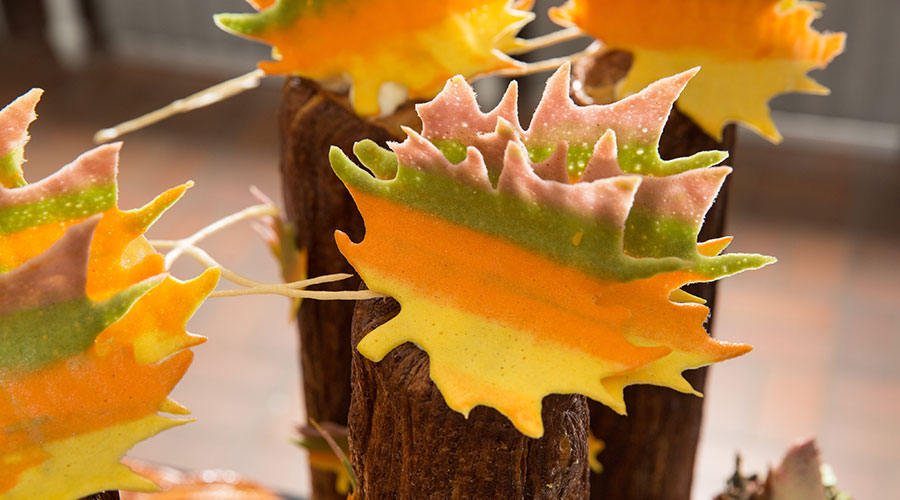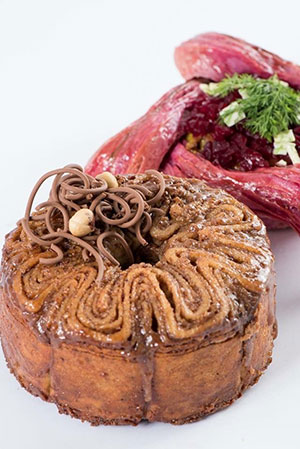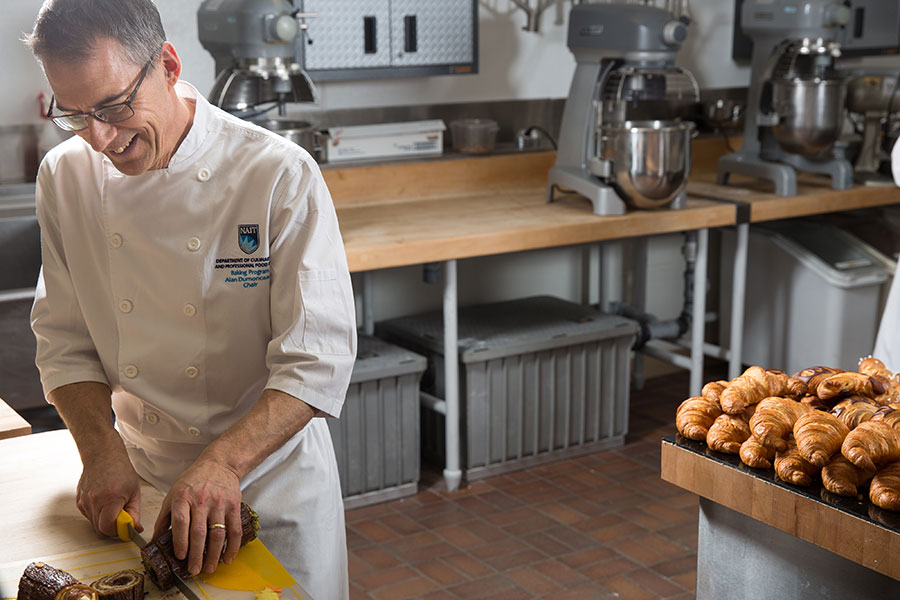NAIT instructor fulfills a dream of testing his skills at the Masters de la Boulangerie in Paris, France
For years, NAIT instructor Alan Dumonceaux (Baking ’05) dreamed of competing in the most prestigious baking contest in the world – the Masters de la Boulangerie in Paris.
Now that he has, he can’t stop dreaming about it.
“Last night it was a dream where I had to redo the competition,” says the chair of the polytechnic’s Baking program. “It was going to start in a couple of hours and I had nothing – I had no ingredients, I had no formulas, and I was running around panicking. Then I wake up exhausted.”
The training and preparation required for the rigourous event – regarded as the Olympics of baking – has taken its toll. But the thrill and honour of being the first Canadian ever to compete in the gourmet baking category, and the ability to pass his experience and knowledge on to his students, has left him feeling grateful as well.
“It’s going to take a little time yet for it to be completely cleared from my mind so I can get back to having a restful night’s sleep,” says Dumonceaux, who is back in the NAIT bakery following the Feb. 5 contest.
A gruelling contest

Dumonceaux competed in Paris in the gourmet baking category against five master bakers from France, Russia, Taiwan, Argentina and the U.S. During the event, each competitor has 10 hours to produce a series of required pastries to exact specifications. They must also create their own original products representing their countries. Dumonceaux made a pastry that looked like a maple tree and another representing Alberta’s wild rose.
In all, he produced 186 breads and pastries from 34 recipes using more than 100 ingredients, all under intense time pressure. “It’s that internal ledger that’s in your head, telling you where you need to be, what’s next,” he says.
Sometimes it’s a matter of dealing with unwelcome surprises.
And sometimes it’s a matter of dealing with unwelcome surprises. The kitchen assigned to him was missing pans and a baking rack at the outset. Then the butter cracked and crumbled instead of smoothing into thin sheets as he layered it into his croissants. He suspects it had been frozen, so he had to ask for new butter and start over. Then his work station flooded and had to be mopped up.
The French flour was also a challenge to work with because it has lower protein content than Canadian flour. Instead of mixing each croissant dough for a total of four minutes, as he does back home, each dough made with French flour had to be mixed for 13 minutes, adding precious time to his work and eating into his 10-hour allotment.
A veteran competitor, Dumonceaux didn’t let it phase him. “All my products turned out really well,” he says.
A first for Canada, a first for NAIT
 Dumonceaux is the first Canadian ever to compete in his category, and one of only two Canadians ever invited to compete at the Masters. His friend and colleague, Marcus Mariathas from Toronto’s Ace Bakery, was the other Canadian, competing in the bread category.
Dumonceaux is the first Canadian ever to compete in his category, and one of only two Canadians ever invited to compete at the Masters. His friend and colleague, Marcus Mariathas from Toronto’s Ace Bakery, was the other Canadian, competing in the bread category.
Two years ago, Dumonceaux and Mariathas, along with former NAIT instructor James Holehouse (Baker ’00), made up the Canadian team in the World Cup of Baking (La Coupe du Monde de la Boulangerie). The best individual competitors from the country teams and from a previous qualifying event in South America were invited to compete in the Masters.
The Masters experience was a huge accomplishment for Dumonceaux, who said he was honoured to be among those chosen. And while he didn’t place first (the French baker did; the rest of the competitors aren’t ranked), he was proud of his showing.
Bakers can only compete in the World Cup and the Masters once, so Dumonceaux won’t get another chance at the top spot. But he plans to share his experience with future competitors as a coach and manager of the next Canadian baking team, once new members are recruited.
"You learn so much," says Clayton Folkers (Cooking '79), who coached Dumonceaux through the Masters. "To me that’s the best part of this. It gives you the chance to experiment with things you wouldn’t normally do in your day-to-day work and explore beyond the usual boundaries."
"In the end, it’s the students who really benefit from it."
“It’s such a learning opportunity for me," Dumonceaux adds. "In the end, it’s the students who really benefit from it. Everything I learn, I talk about with the faculty; I show them new techniques. And with our new, advanced diploma Baking program starting in the fall, we’ll be able to directly pass this knowledge on.”
